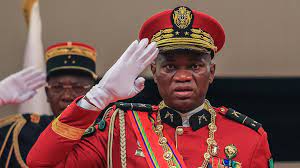General Brice Oligui Nguema, who orchestrated a coup last week resulting in the downfall of Gabon’s 55-year-old dynasty, assumed the role of interim president on Monday. He vowed to conduct “free and transparent elections” at an undisclosed future date.
Oligui, the leader of the elite Republican Guard, orchestrated a coup against President Ali Bongo Ondimba on Wednesday. President Ali Bongo Ondimba belonged to a family that had held power since 1967.
This ousting occurred shortly after Bongo, who is 64 years old, was declared the winner of last month’s presidential election—a result that the opposition decried as fraudulent.
“I solemnly pledge before God and the Gabonese people to uphold the principles of our republican regime,” declared Oligui.
Wearing the distinctive red ceremonial attire of the Republican Guard, Oligui also vowed to “safeguard the foundations of democracy” during the ceremony, which took place in front of judges from the Constitutional Court.
He promptly committed in a speech to organize “free… and transparent elections” following an unspecified transition period. Additionally, he vowed to grant amnesty to “prisoners of conscience.”
On Wednesday, the leaders of the coup announced their decision to dissolve the nation’s institutions, invalidate the election results, and temporarily shut down the borders.
Other countries have yet to formally recognize Oligui as Gabon’s legitimate leader, and he faces mounting pressure to articulate his plans for the restoration of civilian rule.
Oligui was jubilantly hoisted by his troops in celebration following the announcement of the coup. In the days that have followed, he has been frequently seen in the company of generals and colonels.
Furthermore, he has engaged in extensive and high-profile dialogues with various stakeholders, including business and religious leaders, unions, political parties, non-governmental organizations, diplomats, and journalists. During these discussions, he has diligently taken notes and provided comprehensive responses to questions and grievances.
On Friday, he pledged to establish more democratic institutions that uphold human rights, emphasizing that he would proceed with caution and not rush the process.
A faction of the former opposition is urging Oligui to transfer power, but a substantial portion of Gabon’s population appears to be rejoicing over the end of the Bongo dynasty, evident through the celebratory gatherings in the streets of both the capital, Libreville, and the economic center, Port-Gentil.
Numerous Western nations and international organizations have criticized the coup, though they acknowledge its distinctiveness compared to other African coups, primarily due to concerns about the legitimacy of the preceding election.
“While military coups are inherently problematic, it is important to bear in mind that Gabon’s recent elections were marred by significant irregularities,” commented Josep Borrell, the European Union’s foreign policy chief.
Former president Bongo had sought a third term in office, following his rise to power in 2009 after the passing of his father, Omar, who had ruled Gabon with an iron grip for over four decades.
The coup leaders claimed to have placed him under house arrest and declared him to be in retirement. However, Bongo managed to release a video on social media in which he revealed that his son, Noureddin Bongo Valentin, and his wife, Sylvia, had also been detained. He appealed to “all our friends around the world” to raise their voices on his behalf.
On Friday, national TV aired footage of the deposed president’s son and other arrested officials standing in front of suitcases filled with cash reportedly seized from their residences. The military has leveled accusations of treason, embezzlement, corruption, and forgery of the president’s signature, among other charges, against them.
In the last three years, five other African nations—Mali, Guinea, Sudan, Burkina Faso, and Niger—have experienced coups. The new leaders in these countries have resisted calls for a swift return to barracks.




